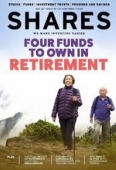Archived article
Please note that tax, investment, pension and ISA rules can change and the information and any views contained in this article may now be inaccurate.
How I invest: rebuilding an ISA to save for retirement

Having invested in shares since he was a kid, Duncan from London is using his investment expertise to rebuild his ISA after spending most of his savings on house renovations.
Duncan, who is in his early 40s, has been investing actively for around 15 years. He works full-time and owns his own home with a mortgage.
He describes investing as his hobby and says: ‘My late grandfather was an accountant. As a young child he gifted me with a small amount of shares in Boddingtons Brewery and Kwik Fit so I had a small interest in following two share prices in the 90s.
‘I first started investing in passive equity and bond funds with a small amount inherited when my grandfather passed away. This was terrible timing to start as it was just before the 9/11 market correction.
‘By around 2005 I had saved up enough money to start trading single name equities. I’ve been active to trade my own money ever since as it has become a bit of a hobby which I enjoy, and I like not paying any fees for active management.’
SAVING FOR RETIREMENT
His main investment priority is saving for retirement, so he is ideally looking to compound as much as possible while trying to limit downside.
He has a high risk tolerance and can stomach a bit of volatility if it ends up with a higher end outcome, and believes he can generate around 6% to 10% a year through economic cycles with this approach.
Duncan has also started saving money into Junior ISAs for his two children, buying stocks for them which he hopes will grow to pay for any educational needs or a flat deposit when they’re older.
In his ISA portfolio, Duncan holds between 15 and 20 stocks, which he believes provides enough diversification as he is ‘thoughtful’ about exposures to sectors, regions and factor risks like the oil price or coronavirus, with position sizing anywhere between 2% and 10%.
‘I can probably split my current portfolio into the areas of blue chip compounders, themes, special situations and more Covid-sensitive names,’ he says.
The top positions in his portfolio include Rentokil (RTO), Ashtead (AHT) and Experian (EXPN).
THE BIGGEST WINNER
Duncan says Ashtead has been his biggest winner, having held it since 2013 and adding extra exposure on a couple of pullbacks in the company’s share price.
Originally looking for some US exposure via a UK listed name, Duncan believes Ashtead has a strong market position in the equipment rental sector. He added exposure having thought they were well placed to do bolt-on acquisitions and take further market share from so-called ‘mom and pop’ operators in
the US.
Duncan says he has had ‘many successes’ in his 15 years of investing, but also made many mistakes. ‘You definitely learn more from your mistakes and try not to repeat them,’ he adds.
Some of his best investment decisions have been selling positions, and he got a call on housebuilder Barratt Developments (BDEV) spectacularly right ahead of the global financial crisis in 2008.
He explains: ‘I read a report on the BBC news in early 2007 about the bad state of the US mortgage market/US housing market and immediately sold my shares in Barratt Developments so missed out on a c.90% collapse in 2008.
‘I couldn’t believe how little they reacted that day I sold and spent the following months thinking I was crazy.’
REACTING TO THE CORRECTION
Since then Duncan has traded in and out of UK housebuilders, building into a core position from 2010 and selling out in 2019. He recently added Persimmon (PSN) and Berkeley (BKG) after a pullback in their shares amid the coronavirus market sell-off.
In late March, Duncan went through his portfolio ‘line by line to clean it up’ following the market correction.
Duncan says he sold stocks in early March that he thought would be directly impacted by coronavirus, such as Trainline (TRN).
But he adds that he got ‘caught out’ by some names which have had ‘more of a secondary impact’ than he expected, like Intermediate Capital (ICP) which he has since sold. Then there are others impacted which Duncan says he will ‘probably try to ride it out’ and look for a longer-term recovery.
Duncan used the market drop to rotate his portfolio, selling some stocks which held up well like Grainger (GRI) and RELX (REL) and rotated into other areas which were weaker, picking out Greggs (GRG) and Compass (CPG), as well as UK housebuilders and insurance stocks like Prudential (PRU) and Legal & General (LGEN).
FUTURE PLANS
Duncan’s plan going forward is to keep adding new exposure on further pullbacks, and will look to add to a mix of high-quality stocks and some more Covid-hit names.
He adds: ‘I think there is a chance that we roll over again to make new lows in the next six to 12 months but I think in two to three years if there is a vaccine we will be back to normal albeit at lower economic levels as we come out of this recessionary period.’
WOULD YOU LIKE TO FEATURE AS A CASE STUDY IN SHARES?
We are looking for individuals or couples who can discuss their experience with investing and some details about their portfolios.
Anyone interested should email editorial@sharesmagazine.co.uk with ‘case study’ in the subject line.
DISCLAIMER: Please note, we do not provide financial advice in case study articles and we are unable to comment on the suitability of the subject’s investments. Individuals who are unsure about the suitability of investments should consult a suitably qualified financial adviser. Past performance is not a guide to future performance and some investments need to be held for the long term.
Important information:
These articles are provided by Shares magazine which is published by AJ Bell Media, a part of AJ Bell. Shares is not written by AJ Bell.
Shares is provided for your general information and use and is not a personal recommendation to invest. It is not intended to be relied upon by you in making or not making any investment decisions. The investments referred to in these articles will not be suitable for all investors. If in doubt please seek appropriate independent financial advice.
Investors acting on the information in these articles do so at their own risk and AJ Bell Media and its staff do not accept liability for losses suffered by investors as a result of their investment decisions.

 magazine
magazine









